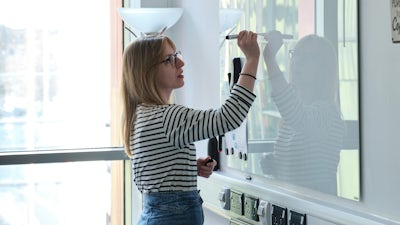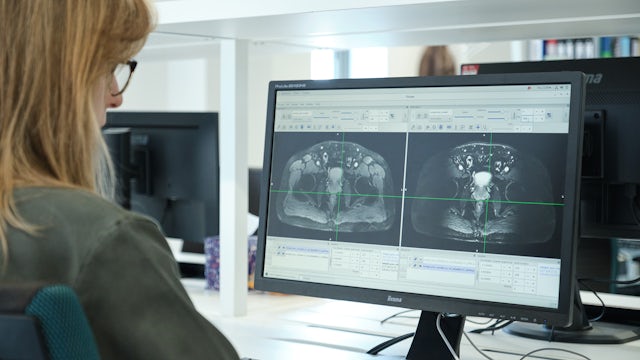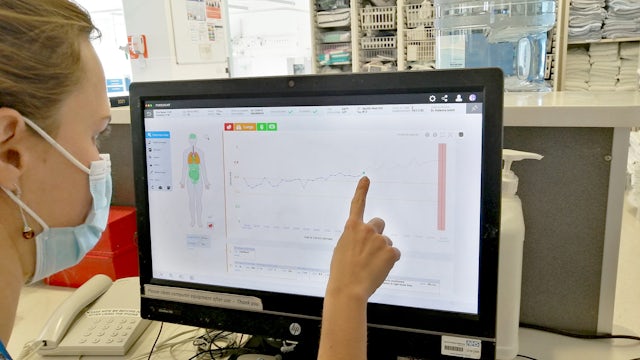

The difference you’re making
Impact Report 2022/23
2022/23 was an exceptional year for philanthropy at Cardiff University. The 90 members of Cylch Caerdydd collectively gave an incredible £3.3m to drive forward world-class research and help Cardiff’s students access the education and opportunities they deserve.
We were also so grateful to receive an astounding £566,000 from supporters who remembered the university in their Will. These gifts are particularly special and will leave a lasting legacy for future generations.
Read more about the researchers and students that you’ve helped to support. Their stories highlight the work that’s being done to save and change lives in Wales and beyond, and prepare the next generation of students for life after Cardiff.
This year, your support has made the following possible. Thank you so much.
- £3.3m in philanthropic donations
- £2.8m towards medical research
- £486,000 towards supporting students to reach their potential
- 150+ Early Career Researchers and PhD students funded
- £566,000 from generous gifts in Wills


Supporting students
Students are at the heart of Cardiff University, but financial challenges can prevent the best and brightest minds from accessing the education and opportunities they deserve. Last year our supporters gave a staggering £486,000 to help Cardiff students achieve their full potential. This support has made it possible for hundreds of students to continue with their studies when times were hard, take up opportunities they might not have been able to, and develop the skills and experience they need for life after university.
Shloka is a recipient of our Cardiff Firsts Scholarship, which provides students from underrepresented or disadvantaged backgrounds with three years of support to help them get the most from their time at university. The support includes a cash Scholarship, a Global Opportunity placement to work, study or volunteer abroad, and a paid internship.
“I’m currently pursuing a master’s degree in Neuroscience. What drew me to the subject is that we possess vast knowledge about the brain, yet there is still so much we don’t understand about this remarkable organ that controls our thoughts, actions, and emotions. What I love most about it is the endless potential for discovery and the opportunity to help unravel the mysteries of the human mind.
"The Cardiff Firsts programme has been an invaluable source of support and inspiration. The Scholarship provided more than just financial assistance. It served as a significant morale boost, fuelling my motivation and self-confidence. As graduation approaches I feel much more prepared to seize opportunities.
"A highlight of the Cardiff Firsts programme was the funded Global Opportunity, which was exhilarating. I had the incredible opportunity to work at a hospital in Melbourne, Australia for a year, where I focused on studying voice biomarkers in Alzheimer’s disease. This research has the potential to use speech and language as a screening tool for Alzheimer’s, creating a non-invasive and cost-effective early diagnosis tool.
"I was so lucky to be able to work under the guidance of Professor Adam Vogel, a leading expert in the field. Building a research study from scratch was challenging, but a truly rewarding experience. I met exceptional people and I’ve built a strong network of global colleagues that will help me in my future career.
"While the financial assistance is undoubtedly essential, the benefits of the Cardiff Firsts programme go beyond that. It’s given me incredible experiences that will bolster my CV, setting the stage for a strong foundation as I embark on my research career.”

"The benefits I’ve received go beyond financial. I have more confidence and feel better equipped to start my career."


Neuroscience and mental health research
Researchers at Cardiff are at the forefront of global progress in understanding the genetics of neurological illnesses. Our research spans childhood through to old age and covers neurodevelopmental disorders such as autism and ADHD, psychiatric disorders like schizophrenia and bipolar disorder, and neurodegenerative diseases including Alzheimer’s and Parkinson’s. By supporting the next generation of neuroscience and mental health researchers, you’re helping to improve our understanding of these conditions and accelerate the development of new, more effective treatments.
Dr Shiva Kompella is a research associate working with the Dementia Research Institute. His research, supported by donations, looks into the impact that air pollution has on neurodegeneration that can cause Parkinson’s disease.
“Parkinson’s is a progressive neurological condition. This means that it causes problems in the brain and gets worse over time. People with Parkinson’s don’t have enough of the chemical dopamine in their brain because some of the nerve cells that make it have stopped working. Around 153,000 people live with Parkinson’s in the UK. And it’s the fastest growing neurological condition in the world.
By the time Parkinson’s is diagnosed, the disease has had an irreversible impact on the brain. If we can understand the changes in the brain before the disease takes hold and detrimental damage happens, not only will we be able to diagnose Parkinson’s earlier, but we’ll be able to treat it more effectively too.
I am an electrophysiologist. I use techniques such as patch-clamp to observe electrical signals of neurons (brain cells) that are derived from pluripotent (undifferentiated) stem cells. My current project involves understanding the changes in the electrical activity and how it affects the communication between neurons due to gene mutations in a protein named LRRK2 – which we know to cause Parkinson’s. It is our hope that this research will lead to earlier diagnosis and earlier intervention.
Previously, I’ve worked on how air pollution affects the electrical activity of the heart and now, thanks to donor funding, I’m combining this knowledge and my data on brain cell development in Parkinson’s. My pilot study will aim to understand how compounds released by burning fossil fuels, which creates air pollution, affect the activity of neurons and could increase neurodegeneration. To date there is no mechanistic understanding of how air pollution can cause neurodegeneration. I hope my research can shed light on this and improve our understanding of how environmental factors affect neurodegeneration.
This information could support stronger environmental policies and make them easier to implement.”

"I’m so grateful to donors. This funding is a huge boost for me and for my research. It has enabled this study and the start of a new idea, which has the potential to help us understand more about the causes of Parkinson’s disease."


Cancer research
Cancer research at Cardiff University is helping to improve outcomes for patients and develop new therapies for the future. Across the university, researchers are working on cancer biology, drug discovery, prevention, early diagnosis, psychology, and social impact. Thanks to our supporters, the next generation of researchers are developing new, more effective treatments, improving survival rates and quality of life for people with cancer, in Wales and beyond.
Dr Malwina Molendowska (PhD 2023) was awarded her doctorate while based at the Cardiff University Brain Reimaging Centre (CUBRIC). She has used magnetic resonance imaging (MRI) technology to help improve early detection and diagnosis of prostate cancer.
“In the UK, around 1 in 8 men will get prostate cancer in their lifetime. Prostate cancer mainly affects men over 50, and your risk increases with age. The risk is even higher for Black men and men with a family history of prostate cancer.
"The current method of diagnosing prostate cancer involves a blood test and a physical examination, but neither are conclusive. In fact, sometimes the results can be ambiguous, neither confirming nor ruling out cancer. This means patients often have to undergo further testing and an MRI scan in the hospital to assess what’s going on. Even at that point, suspicious benign lesions can mimic cancer, or some changes might be invisible. This can lead to further invasive testing, such as a biopsy, and increase the burden on the patients, making it a very stressful and painful experience.
"I believe that scans performed on more powerful MRI machines can give us more accurate information to aid diagnosis and provide patients with a non-invasive, but more conclusive step on their diagnosis journey.
"Cardiff University has incredible research facilities such as CUBRIC, which houses one of the most powerful MRI scanners in the world. This scanner is primarily used to study the brain, however as it has whole body capability, we decided to use it in prostate cancer research to improve imaging strategies, and ultimately better understand ongoing changes in prostate tissue. We believe that such advancements could soon reach clinical sites and improve the workflow of prostate cancer screening.
"I was so grateful to receive funding through the Future Leaders in Cancer Research programme, supported by donors. I used this funding to conduct pilot scans on NHS patients who have been identified through clinical assessment (including biopsy) as ‘Active Surveillance’ patients. This means that they don’t need treatment right away, but as doctors are concerned about changes in the prostate, they will be observed. I have been able to test novel MR sequences on the MRI scanner and have seen really promising results.
"These results will guide my ongoing research with the aim of making prostate cancer diagnosis less invasive and more accurate. This would just not have been possible without your support. Thank you.”



Research discoveries
Postgraduate study allows students to drive forward new ideas and make fascinating discoveries which have a positive impact on society, the environment, health, and culture. Your support has made PhD study possible for budding researchers and enhanced the employability of our pioneering research students.
Marina is a student in Cardiff Business School and her PhD is supported by the Hodge Foundation.
“My journey to academia has been an unconventional one. I used to be a professional tennis player, and while I loved travelling the world, I was often saddened to see disparity and inequality. I feel compelled to bring these challenges to light and help our society to generate solutions.
"My PhD is researching public policy, sustainability, and digital innovation. I am investigating two novel progressive policies in Wales – The Wellbeing of Future Generations (Wales) Act 2015 and the Digital Strategy for Wales. I hope to decipher how digital technologies can contribute to and progress the sustainability agenda in Wales.
"From my data so far, one immediately important concept is digital inclusion – enabling people to be a part of today’s digital world via the provision of access, skills, and confidence. Digital exclusion occurs for several reasons – the cost-of-living crisis, geographical location, and personal circumstances, for example, missing training courses because of employment or caring responsibilities. The resulting inconsistencies in the technology applied to healthcare, education, and public service delivery is causing disparity amongst people living in Wales and other regions.
"I hope to create a theoretical framework detailing specifically what digital inclusion entails, as well as how it interacts with Wales’ green goals, since definitions we currently have are incomplete and Wales is an understudied setting.
"This framework would bring forward a social justice agenda – the first of its kind – to help close the digital divide in Wales and set an example for others to follow.
"The results of this project could help transform how we understand and measure digital inclusion, shining the spotlight on those in greatest need of help.
"I am incredibly proud to conduct my research in Wales, through which I can help both Welsh and global society by facilitating truly progressive, positive change and giving marginalised voices a chance to be included in today’s digital era.”

"The results of this project could help transform how we understand and measure digital inclusion, shining the spotlight on those in greatest need of help."

Helping Cardiff students to realise their full potential
Scholarships mean students who might not otherwise be able to afford university can access the education and opportunities they deserve. Thanks to generous donations, countless students have been given the financial security to start or continue their studies at Cardiff University.
An international Optometry student from Tanzania, Godluck’s Clinical Optometry MSc was part-funded by the Fanaka Scholarship, which was set up by alumnus Mushtaq Karimjee (BSc 1971) and his wife Vilas.
Mushtaq, an Engineering alum from Tanzania himself, wanted to support students from his home country and give them access to the world-class education he so valued. He also wanted to give something back to Tanzania, supporting students who would take the skills and knowledge learned at Cardiff University back home to benefit communities there.
Godluck has recently completed his studies and has returned home to Tanzania.
“I wanted to study Clinical Optometry because it could mean saving someone’s vision. The joy someone experiences from being able to see again gives me purpose. I decided to specialise in children’s eyesight because back home in Tanzania, there are children who have vision problems but so many eyecare practitioners don’t understand their condition or know how to treat them. I wanted to help them regain their vision – working with children is very challenging, but I love it.
"I was so happy to receive the Fanaka scholarship. I was supposed to come to study in Cardiff the previous year but postponed it because of financial difficulties. The Scholarship reduced the financial burden on me and my family – I wouldn’t have been able to come and study when I did without it.
"I’m so grateful to Mr and Mrs Karimjee. Thanks to them, I can help people back home regain their vision and their lives. As well as working in paediatric eyecare, I would like to teach. Teaching more people will help to share this knowledge to another generation, so Tanzania has even more qualified optometrists to help people.
"Scholarships like this are so helpful for people like me and will create a ripple effect into the future. Maybe in a few years, I can be in the Karimjee’s shoes, helping someone else who was in my position.”

"Life has been good to me, so I wanted to give something back. I feel very proud to know that Godluck is going back to help and teach others."


The impact of gifts in Wills
Gifts in Wills have a lasting impact on the future of Cardiff University’s research and help support students for generations to come. You can help improve diagnosis, treatment, and care, and ensure the brightest minds have the foundation to flourish.
Aled Rees is Professor of Endocrinology and Consultant Endocrinologist at Cardiff University’s Neuroscience and Mental Health Innovation Institute.
Thanks to a generous gift in a Will, Professor Rees has been able to fund a range of new projects which are looking into diseases of the pituitary gland. These disorders affect the production of hormones which regulate the thyroid gland, growth, adrenal function and reproductive hormones.
“Thanks to the legacy gift we’ve received, we’ve been able to fund three main projects. The first of these has looked at developing a new and more convenient way to assess patients for adrenal insufficiency, a condition which is common in pituitary disease but also in other situations such as in patients taking long-term steroid therapy.
"Patients with adrenal insufficiency can struggle with fatigue, weight loss and an increased risk of immune problems, including difficulty fighting off infections.
"The current ‘gold standard’ test for adrenal insufficiency is to measure cortisol levels in the bloodstream before and after an injection which stimulates the adrenal glands. However, these levels can be affected significantly by other factors such as oestrogen treatment (including HRT), nutritional disorders, liver and kidney disease. This makes interpretation of the test challenging and means that patients taking oestrogen need to stop treatment for several weeks in advance. As an alternative, my team are measuring cortisol levels in saliva, which should prove an equally accurate and much more convenient test for patients.
"We are also looking at adrenal insufficiency resulting from steroid use, and the risk of infections. When patients are given higher steroid doses, their adrenal glands cannot produce enough cortisol which leads to adrenal insufficiency. We need to better inform patients on when and how to increase their steroid doses at times of illness, but we don’t know who is at increased risk of becoming particularly unwell. We suspect that some patients on low steroid doses, particularly if they are given for only a short time or by non-oral means, may not be at a higher risk.
"To test this, my team are working with Swansea University to review patients who took steroids during the pandemic. This will allow us to target education to those who really need it, whilst avoiding unnecessary health anxiety in others.
"A final study supported by this legacy funding is looking at the value of molecular imaging in the investigation of pituitary tumours. These tumours affect around 1 in 2,000 people and can cause headaches, vision problems, weight gain, menstrual irregularities or erectile dysfunction among other symptoms. My team are using a new PET imaging method where we inject patients with a specific tracer molecule that ‘lights up’ smaller tumours, which can be difficult to spot using MRI.
"As this tracer has a longer half-life than other molecules, it could also be sent to PET scanners closer to patients, meaning they wouldn’t have to travel so far for their appointments. Our early results are promising and we hope that with additional testing that this technique will enable us to identify smaller tumours more easily, which will help in guiding treatment decisions such as surgery, medical therapy or radiotherapy.”



